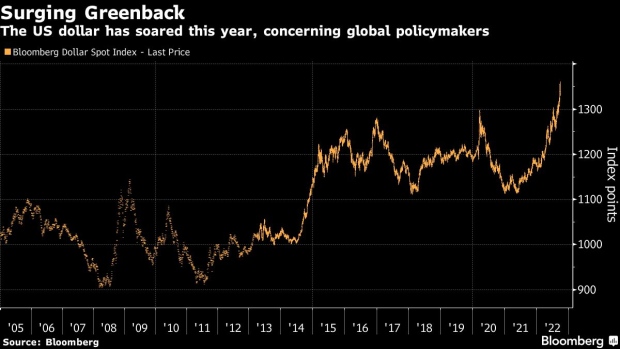Sep 30, 2022
Coordinated Intervention to Tame Dollar ‘Just a Matter of Time’
, Bloomberg News

(Bloomberg) -- Widespread central-bank action to stem the US dollar’s relentless rise is looking inevitable for the first time since the 1980s, according to Standard Bank’s Steven Barrow.
Coordinated measures by global policymakers are “just a matter of time,” even if the US and some others have to be “dragged to the FX intervention table kicking and screaming,” Barrow, the bank’s head of G10 strategy, wrote in a note.
The call reflects increasing concern over the stronger dollar’s impact on the global economy. A gauge of the greenback’s strength against a basket of currencies surged to the highest in data going back to 2005 earlier this week, though it has fallen back slightly. The euro fell to its lowest since 2002, the yen its weakest since 1998, while sterling slid to an all-time trough.
Central banks have recently shown their resolve to keep order in financial markets, with Japan looking to stop a selloff in the yen, and then the Bank of England saying it would buy long bonds to calm a chaotic gilt market. Policymakers worked together in March 2020 to improve US dollar liquidity through swap line arrangements and also coordinated to weaken the yen in 2011 and to strengthen the euro in 2000.
The last time central banks took concerted action to weaken the dollar was under the Plaza Accord of 1985. A key difference back then was that the US had already broken the back of inflation, whereas now the outcome is very much undecided.
Inflationary Effect
According to Barclays Plc analysts Themistoklis Fiotakis and Sheryl Dong, markets may be underestimating the inflationary effect of a rising dollar on the rest of the world.
“This is because a large part of global trade invoicing is taking place in dollars and thus, currency moves versus the dollar tend to have an immediate and sizeable effect,” they wrote in a note.
Barrow said a currency intervention is more likely than a global effort in bond markets, citing the inflationary impacts from bond buying.
“Once the gilt market stabilizes, the BOE will step back and return to its plan to sell gilts,” he said. “Other central banks too that have bought bonds in the past will be unable to engineer a volte face as long as inflation is high and rates are being raised.”
©2022 Bloomberg L.P.






